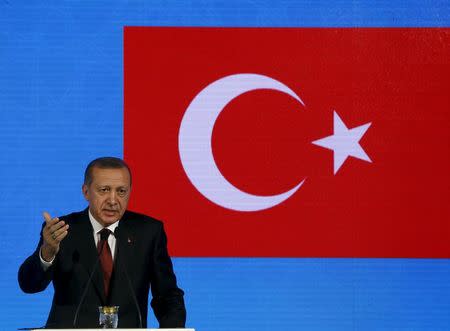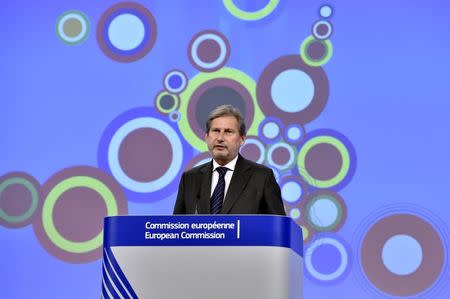Days before summit, Turkey, EU face big hurdles to migration deal
By Robin Emmott and Francesco Guarascio BRUSSELS (Reuters) - Prospects for a grand bargain between Europe and Turkey to stem a flow of migrants into the continent are uncertain days before a summit on Sunday meant to seal a deal and put fraying relations back on a firm footing, EU and Turkish officials say. How much money Turkey will receive for settling more Syrian migrants, the pace at which Turkey's long-stalled EU membership bid can be accelerated and whether Brussels can deliver on its promise of easier travel for Turks are all unresolved. "We are not there yet," said a senior European Union official. Turkish officials also said they had not finalised an agreement, raising questions about whether Ankara was holding out for a better deal at the summit. Officials want it to be essentially a signing ceremony, attended by the EU's 28 leaders. Turkish President Tayyip Erdogan will not be attending, despite his desire for more high-level contact with EU leaders. He will leave the three-hour meeting in Brussels from 1500 GMT to Prime Minister Ahmet Davutoglu. Complicating the picture has been Turkey's confrontation with Moscow over its shooting-down of a Russian warplane in its air space, just as Europe is seeking Russian help in defeating Islamic State militants after the Paris attacks. At stake is whether the European Commission, the EU executive, can deliver on its gamble to deepen ties with Turkey to ease the migrant crisis, despite deep concerns about what Brussels sees as Erdogan's authoritarianism and a surge in violence in the mainly Kurdish southeast of Turkey. European Commissioner Johannes Hahn, who handles EU enlargement policy, told Reuters last week the summit would mark a "fresh start" with Turkey a decade after Ankara started its membership talks to join the European Union. The EU wants to see Turkey help curb the influx into Europe of migrants including refugees from Syria's civil war in return for 3 billion euros ($3.18 billion) in EU aid over two years. While 500 million euros comes from the EU's budget, the remainder must be raised from EU governments. Most have not said how much they will offer, leaving it unclear if the fund can indeed reach 3 billion euros. Turkey is seeking 3 billion euros a year, according to a senior EU official involved in negotiations with Ankara. European Council President Donald Tusk, the former Polish prime minister who now chairs EU summits, called the summit earlier this week in an apparent move to force Turkey's hand. Pressure is rising on the EU to solve its worst migration crisis since World War Two as borders have begun to close on the main Balkan refugee route towards the heart of Europe, drawing condemnation from the United Nations. CYPRUS QUESTION Roughly a million refugees and migrants fleeing war and deprivation in the Middle East, Africa and Asia are expected to arrive in EU economic powerhouse Germany alone. Traditional refugee haven Sweden announced it will tighten border controls and asylum rules to stem the flood of asylum seekers. Various EU states' tightening of frontier checks threatens Europe's prized 26-nation Schengen zone of passport-free travel. Central to the success of any EU-Turkey deal is the end of the stalemate on Cyprus, the Mediterranean island divided for four decades between the Turkish-controlled north and Greek Cypriot south, which joined the EU in 2004. "The Turkish are now playing a constructive role in Cyprus, but we have an interest not to overload the boat," said a senior EU official. "Turkey's membership talks have to run in parallel with the Cyprus talks." One risk is that Turkey may push too hard to open new negotiations with the EU. Six new so-called "chapters" of talks, including energy, the judiciary and security, may be opened by spring, but all 28 EU states must agree to it. Differences between the EU and Turkey may also arise on the issue of visa-free access to the EU for Turkish citizens. A deal would entail full visa liberalisation from 2017 but only after Ankara implements the migration deal for at least six months. But the new security threats in Europe exposed by the deadly Islamic State attacks on Paris may harden some EU states against opening up borders to a large Muslim population. (Additional reporting by Nick Tattersall in Istanbul; Editing by Mark Heinrich)

 Yahoo News
Yahoo News 

